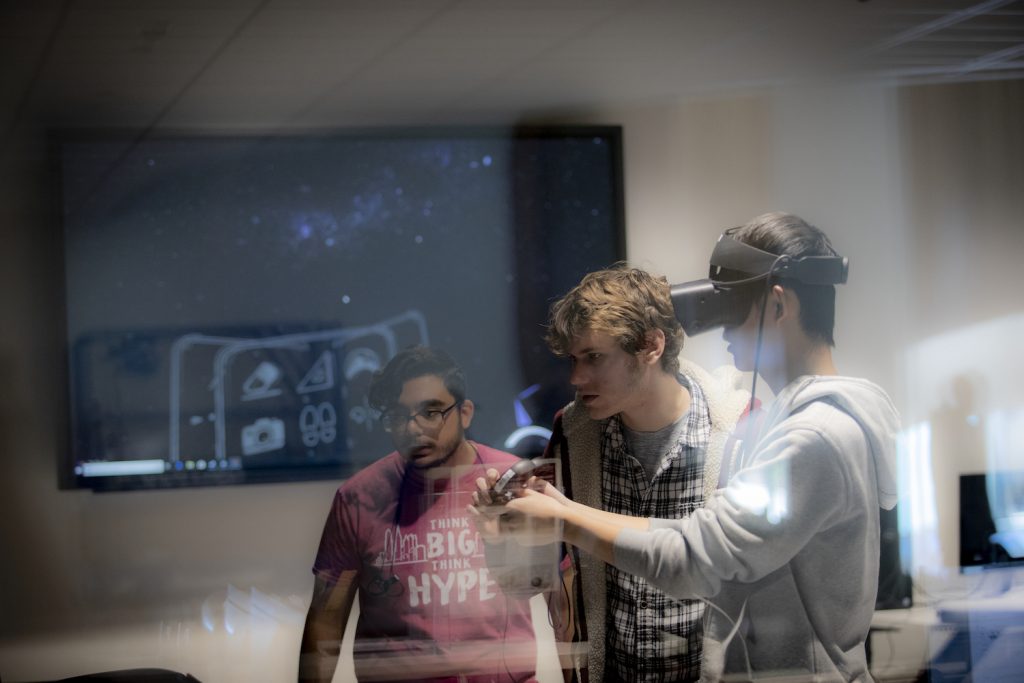Disruptions: in life and in business, they’re often unavoidable.
So, what better way for business students to learn how to respond to disruptions than to swap out comfortable, one-dimensional platforms like Zoom for the new, fully immersive world of virtual reality (VR)?
That’s exactly what Bertrand Guillotin, associate professor of management at the Fox School, set out to do in IB 5503: Disruptions and Strategic Responses course.
The summer graduate course uses concepts and frameworks to respond to technical, geopolitical, social and economic disruptions in an international business context; and, through the use of VR, students were immediately confronted with a change to their traditional learning experience.
“The virtual reality world is actually a disruption. And so, it provides opportunities and challenges. I wanted to make sure that students are ready for both sides of the equation.” explains Guillotin. “The VR world is a little bit nerve-wracking [for students] because they’re taking a chance with a class they have never taken before and they are disrupting their own world.”
The Fox School’s Online & Digital Learning Department equipped each of Guillotin’s students with an Oculus Quest for the duration of the course, and students took on the challenge of learning how to navigate the device and its demands, including charging and updating the device, as well as memorizing device controls.
Guillotin began preparing for the course in February with support from Fox’s Online & Digital Learning team. During this time, he created his VR avatar, learned device commands and curated landscapes and images associated with the case studies they would discuss in class, in addition to his traditional responsibilities like preparing the syllabus, coursepack, Canvas page, quizzes, etc.
“You have to be ready to do more work,” says Guillotin. “[Preparing] took an enormous amount of time, but I think it was very rewarding because you see from the inside out how disrupting your world makes you feel.”
For five consecutive weeks over the summer, Guillotin and his students met each Thursday night for two hours, split between Zoom and their Oculus Quest devices. Because of the intensity of the VR experience, the class would use VR only for around 30 to 40 minutes at a time and use Zoom for the rest of the class time.
Overwhelmingly, the student reception to using VR tools was positive—so much so that, after the first few weeks, students kept asking to increase their VR usage.
“It was really hard to not do more in the VR after four weeks. The fifth week I had to basically tell them like three times or so we need to get back on Zoom,” says Guillotin. “It changed their perspective. Some [of the students] wrote that they really loved VR with the topic of the class. Basically, it’s very credible when you talk about disruptions, because you actually disrupt yourself and you disrupt the class.”
Guillotin also says many students felt more comfortable using technology and better able to tackle disruptions in their professional careers because of their experience using VR in the classroom. Many of Guillotin’s students, like Ashley Carespodi, felt VR positively enhanced their learning experience as a whole.
Wanting to come out of the COVID-19 pandemic feeling she had achieved something great and challenged herself, Carespodi decided to pursue her MBA at the Fox School.
Taking Guillotin’s course, Carespodi says she used VR to “enter a unique course reality.”
“I found the experience to aid engagement and furthered conversations,” explains Carespodi. “It was interesting to look around and see avatars versus looking at a screen full of Zoom boxes. I believe that VR allowed for more engaging conversations.”
Carespodi hopes the classes she has taken at the Fox School, like Guillotin’s, will help prepare her for career advancements in a predominantly male-driven industry.
Although it took plenty of extra work to make happen, disrupting the classroom with VR seems to be a success.
“I think the benefits are greater than I expected,” says Guillotin. “If you prepare well, you can actually have a great, academically rigorous experience. Plus, with the VR excitement not distracting you from the learning and actually getting you ready for living and breathing through disruptions, I think that’s the proof in the pudding, so to speak.”
